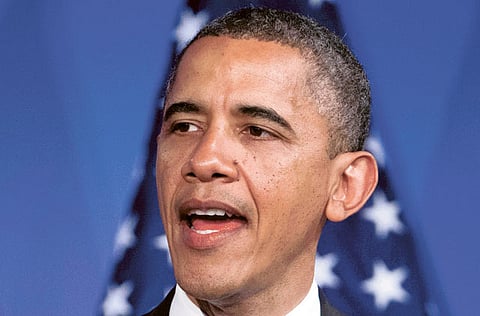Barack Obama’s $3.9tr budget proposal calls for new taxes, more spending
Proposal lays out a familiar wish list of domestic initiatives that have been ignored

Washington: President Barack Obama sent Congress a $3.9 trillion (Dh14.3 trillion) budget blueprint on Tuesday that seeks fresh spending to boost economic growth but also aims to tame the national debt by raising taxes on the rich, squeezing payments to health care providers and overhauling immigration laws.
Congressional Republicans immediately rejected the request for fiscal 2015, saying that the proposal would bust limits on agency spending that the White House endorsed in December.
But the blueprint, the fifth of Obama’s presidency, was not designed primarily to influence the latest round of congressional budget talks. Instead, it charts a course for Obama’s final years in office, laying out a familiar wish list of significant domestic initiatives that have been ignored.
To that end, the proposal calls for $76 billion over the next decade for early childhood education, financed through higher taxes on tobacco. It seeks $70 billion for highway construction, financed by taxing the accumulated foreign profits of multinational corporations.
It would expand the earned-income tax credit — one of the government’s largest and most important anti-poverty programmes — for childless working adults, covering the $60 billion cost by eliminating tax breaks for hedge-fund managers and self-employed professionals.
And it would pump $56 billion next year alone into what Obama calls the ‘Opportunity, Growth and Security Initiative’, essentially a grab bag of fresh cash for agencies affected by sharp spending cuts known as the sequester. The extra money would benefit the Pentagon, preschool programmes, the National Institutes of Health, climate research, job training programmes and a new parental-leave benefit — much of it aimed at providing support to a struggling middle class.
Squeezing the wealthy
The new spending is focused on areas where the administration has long said that the government’s commitment is inadequate to support economic growth and international competitiveness. The funding, meanwhile, comes almost entirely from big business and the wealthy, two groups Obama has targeted to pay their “fair share.”
“Our budget is about choices, it’s about our values,” the president said on Tuesday during a visit to Powell Elementary School in the District of Columbia. “As a country, we’ve got to make a decision if we’re going to protect tax breaks for the wealthiest Americans or if we’re going to make smart investments necessary to create jobs and grow our economy, and expand opportunity for every American.”
House Speaker John Boehner, R-Ohio, derided the spending plan as “a clear sign this president has given up on any efforts to address our serious fiscal challenges.”
“After years of fiscal and economic mismanagement, the president has offered perhaps his most irresponsible budget yet,” Boehner said in a statement. “Despite signing last year’s bipartisan budget deal — and touting it as an accomplishment — the president now proposes violating that agreement with a spending surge.”
That surge would not, however, significantly affect the nation’s fiscal outlook. As a result of more than $1 trillion in tax increases over the next decade, Obama proposes to make a major dent in projected budget deficits. For next year, the White House forecasts a deficit of $564 billion, or 3.1 per cent of the economy. By 2024, Obama sees the deficit falling to 1.6 per cent of the economy, the smallest annual deficit since 2007, before the Great Recession dealt a terrible blow to government finances.
A shrinking deficit would reduce borrowing, causing the accumulated debt to grow more slowly. By White House forecasts, the portion of the national debt held by outside investors would grow from about $13 trillion today to nearly $19 trillion in 2024. But it would shrink as a percentage of a growing economy, dropping to 69 per cent of the economy over the next decade, from 74.4 per cent today.
Sign up for the Daily Briefing
Get the latest news and updates straight to your inbox


